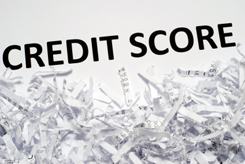
Whenever you need to borrow money a lender will first check your credit, or more accurately, your credit score.
Your credit score is based on the information in your credit report and it measures the likelihood you will repay the loan. If you have a high credit score, you will qualify for more loans and pay lower better rates. In other words, the higher your score, less you'll pay.
Credit scores are three-digit numbers used by lenders when evaluating the risk of lending you money. Scores can range from 300 to 850, with almost 30% of the population ranking between 750 and 799.
Although there are different types of credit scores that are available to lenders, the most commonly used (especially for big loans) are called FICO scores. FICO scores are based on a scoring system created by Fair, Isaac & Co. and are provided to lenders by the three national credit bureaus - Equifax, Experian and TransUnion.
You can get your (or a similar type of score) from any of the national credit bureaus (see below). In fact, while you're at it, you should get a free copy of your credit report and review it of any mistakes (they happen frequently), which can negatively impact your score.
Your credit score is usually based on these criteria:
Paying your bills on time: If you have paid bills late, have had an account referred to a collection agency, or have ever declared bankruptcy, this will show up in your credit report and negatively impact your credit score.
Outstanding debt: If the amount you owe is close to your credit limit, it will probably have a negative effect on your score.
Long or short credit history: A short credit history may have a negative effect on your score. This can be offset by other factors, such as timely payments and low balances.
Number of new credit applications: If you have recently applied for lots of new credit accounts, it may negatively impact your score.
Type and number credit accounts: A variety of installment loans and credit cards may improve your score. However, too many finance company accounts or credit cards might hurt your score.
To learn more, see the Federal Trade Commission's publication on credit scoring at www.ftc.gov/bcp/edu/pubs/consumer/credit/cre24.shtm.
How to Get Your Credit Score
If you were denied credit, you can get a free credit report from the bureau that supplied the credit information that was the basis for denial. Some states entitle residents to a free credit report once a year. TransUnion automatically includes your credit score in your report.
Only Equifax offers consumers their actual FICO score. You can buy it online at Equifax or myFICO.com. The other two national credit bureaus, TransUnion and Experian, do not use FICO scores, but use their own type of score. Their scores are comparable to FICO scores and basically work the same way.
The Experian score can only be purchased online. The TransUnion score (included whenever you buy your TransUnion credit report,) may be purchased online, by mail, or, in some cases, by phone.
Related Articles
- How to Improve Your Credit Score
- Does Mortgage Aid Hurt Your Credit?
- 5 Tips For Improving Your Credit Score
- Correcting Fraudulent Information in Your Credit Report
- How Landlords Can Use Credit Scoring to Make Rental Decisions
- How To Reduce Your Rent
- Saving and Managing Your Money During a Recession
- Buying A Gift Card? What You Need To Know.
 Print
Print Email
Email






